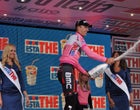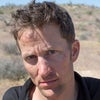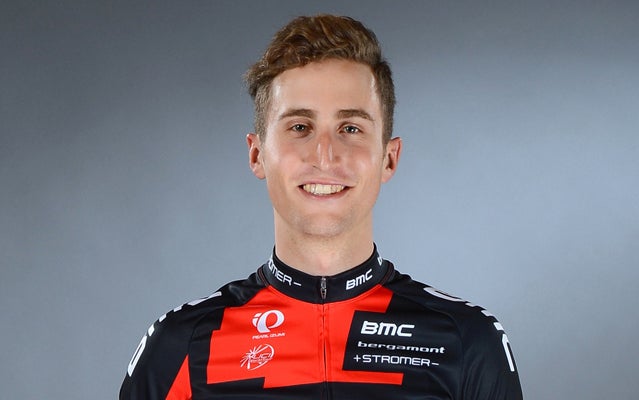Taylor Phinney is probably the most recognizable face of new American cycling, in no small part because he’s the son of former pro cyclists and Olympic medalists Davis Phinney and Connie Carpenter-Phinney. But the 22-year-old has already shown that he’s not content to just ride his parents’ yellow and gold coattails.
The Young Americans
Andrew Talansky Phinney celebrating at the Giro d’Italia.
Phinney celebrating at the Giro d’Italia.Even before he turned pro in late 2010 with BMC Racing Team, Phinney racked up a string of staggering results on the track, including in the individual pursuit. He also proved his Classics capability with a victory at the Under 23 edition of Paris-Roubaix in 2010. Last year was his breakout as a pro, and the Boulder, Colorado, native won the individual time trial at the USA Pro Cycling Challenge and narrowly missed medaling at the London Olympics with fourth-place finishes in both the road race and the time trial. He accomplished his biggest goal of the season, though, by to become just the third American to ever don the race leader’s pink jersey.
Phinney is as engaging off the bike as he is in the saddle. At 6’5” and 185 pounds, he commands the room compared to most diminutive cyclists, is quick with a joke and easygoing in front of a crowd, and moves with the self-assurance of an athlete many years older. That precociousness is especially evident during team time trials, when Phinney is often organizing and driving to top finishes. And when a race suits him, he’s not afraid to take on—and beat—more experienced riders. We chatted with the young American earlier this week to find out if he thinks he can repeat his success at the Giro d’Italia, which starts Saturday.
You’ve wrapped your second Classics season as a pro. How did it go?
It went well. I had a nice result in Milan-San Remo, and it was a pretty interesting version of that race with all the snow and cold. My ultimate goal of this part of the season, Paris-Roubaix, didn’t go quite as well. It was a good race tactically as I was able to be in the right places when I needed to be there. I missed Flanders the weekend before because of a knee problem, so my legs weren’t quite open at Roubaix.
And I’m learning that preparing for a one-day race takes a bit more experience. In a stage race, the multiple days can average out to a less-than-perfect day. In a one-day race like Roubaix, you have one chance. Being able to come in the day of a race like this firing on all cylinders … I’m still learning. But I’m happy. It was better than last year, for sure, and I was in the right places. Now I have to arrive there ready to go 100 percent full gas.
Your size and strength make you well suited for the Classics. Are they the races that interest you most?
I’m a bigger rider, 85 kilos (187 pounds), though I can get down to 82 (180 pounds) by summer. So I’m a little bit hindered on the climbs relative to the smaller guys. My body is probably going to change over the next 16 years with the more grand tours that I do. But at this point in my early career, I have to focus on what I’m good at. That’s time trials and Classics.
I like the hard-man aspect of the Classics. You need to be a real man to be a Classics rider. Paris-Roubaix is the biggest, most important of these races. It’s a race that I have always loved. When I think of this part of my career, it would be the most beautiful race to win. Roubaix is the pinnacle. But before Roubaix, I’d say an Olympic medal is an even bigger priority.
Milan-San Remo was definitely a hard man’s race this year. Walk us through it.
We all knew it was going to be wet and cold. But it wasn’t just raining at the start. The temperature was also dropping. In a 300-kilometer race (186 miles), when you look down and see you’ve ridden 20km (12 miles) and you’re already shaking uncontrollably, you think, “Wow, this is going to be just great.” But you’re not going to stop because it’s Milan-San Remo. You just plow on.
The rain turned to snow, and the snow was adding up on the sides of the roads. I started hearing a rumor that we were going to get into the bus in 50km, and that sounded like the best thing ever to me. But then I thought guys were just messing with me, and it made me mad. They did stop the race, though, and we got to go into the bus for around an hour and a half. They shortened the race, and when we started back up again it was still cold but it wasn’t as bad mentally.
I won’t say that I liked it. But I don’t mind those conditions as much some other riders. At the end, I didn’t go with the initial move at the top of the Poggio. But when our group topped it, I launched out, mostly to be safe. I didn’t think it was possible to bridge to the front group, but once I was away I decided to channel my inner Fabian Cancellara. It was really painful, but it’s Milan-San Remo so you think, “I just have to dig deeper.” Near the finish, I came on the riders, and I was really surprised, like, “Wow! That’s the front group at Milan-San Remo.” My inner cycling fan was freaking out that I might get the chance to watch these guys sprint it out. Then I was like, “Wait a second, I might catch them. I might be able to sprint it out.” I was 100 meters too late, but I was just happy to be there.
Now it’s on to your second Giro. What was it like to win the prologue last year?
It was a big steppingstone and a confidence boost. Other than the Olympics, it was my big goal last season. Going into the race, I knew that before me there were only two other Americans who had ever worn the pink jersey, Christian Vande Velde and Andy Hampsten. So I knew that if I could win that day, it would be a defining moment in my season and my career. I really committed to it and worked hard all winter to achieve that goal. I wasn’t afraid to say that I was there to win it. It was the same at the Olympics, I went there to medal. It , but I wasn’t afraid to say I was there for the win.
You have amazing confidence for a 22-year-old. Do you ever think you’re too young for all the success?
I would say yes except that Peter Sagan is my age and he makes me look like your average Sunday recreational cyclist. I am not afraid to be confident or want to win when it’s something that’s fully in my grasp. Going into a short time trial like the prologue at the Giro, I knew that I had already won World Championships on the track when I was 18 and 19 in the four-kilometer pursuit, and that’s basically a short time trial. So based off my skill set, I knew that if I worked hard I could win. When you set something as a goal and you build up to it, you can’t go in saying, “We’ll see what happens.” There’s no point. I ride my bike 30 hours a week, and if you work that hard at something, you’d better be doing it to win.
The first and second stage of the Giro this year, a flat finish and a team time trial, suit you. Do you think you can wear the pink jersey again?
The dream scenario is to go in on the first day and have a good sprint with Adam Black in Naples. And then we have the chance of winning the team time trial on Tuesday, so that would put one of us into the jersey. There’s even a chance for me to sprint for the win the day after. But there are a lot more variables this year than there were last year. It’s something that could happen, but we also have loftier goals as a team with Cadel [Evans] as the leader. And that takes precedence.
Do you feel like you have to win because of your parents’ successes?
My parents have never said, “You’re our son and you should race a bike.” They let me dive fully into soccer when I was in school. And then when I came to it and decided I wanted to try cycling, they let me do that too. They realized that I was a smart kid but wasn’t necessarily a school person, so when I told them I wanted race my bike full time after the Beijing Olympics there was no pressure about college. They have always been supportive. I have never felt pressure from them.
Many of the doping scandals and bad press in cycling lately has been about Americans. Do you feel any weight to make good for that?
I don’t feel extra weight. When I was reading the USADA reports, I wasn’t thinking, “I’m going to bring this sport out of the darkness.” I was as shocked as everybody else, and it took me a long time to digest it.
But I feel a responsibility. I have always had a clear moral clarity toward sports. I have a firm stance about anything pharmacological. I pretty much draw the line at caffeine gels. Anything beyond that, I just won’t do it. There is gray area, like Sudafed or a strong narcotic like Tramadol. Those things are legal. It’s for guys who have legitimate problems and are torn up from a crash or something. But then there are guys who take these things even if they don’t need it.
I don’t know what that would feel like to race on a heavy painkiller. I don’t want to know. I can do it without, and everyone can too. That’s the way that we can start to rebuild the foundation. The way I see it, we have a chance to potentially make the cleanest sport in the world. All I can do is have my own firm boundaries and then communicate with my fans about how we are approaching races.
What do you say to the skeptics who think that pro cycling can’t exist without doping?
You can’t use the word “everybody” regarding anything in life. It doesn’t hold up every time. People have the right to be cynical. Even I’m cynical. I think about certain performances, and I wonder. I hate that I think those things about my colleagues and the guys I race with. But given the past, the cynicism is natural.
I think it will go away with time. And all I can do is lead by example. I have stated and will continue to state the things I don’t agree with. I think and hope that if people see my stance and see the approach I’m taking, they’ll believe in me and start to believe in the sport. And hopefully we’ll move forward.


